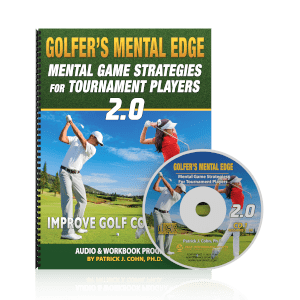
Shift Your Perspective to Reduce Expectations
Would you describe golf as a stressful sport? Do you put excessive pressure on yourself during competitive rounds?
One way of examining how much pressure you place on yourself is by examining your self-statements. When you say, “I have to win,” “I should shoot under 75,” “I must finish in the Top-10,” your expectations shift into high gear.
“I have to” has the underlying message that I need to do this or I am failing to play up to my potential in golf.
When you say, “I should,” the hidden meaning you are telling yourself is “I am not playing at a high level.”
When you say “I must,” you are sending yourself the message, “I am not any good if I don’t play at a certain level.”
These self-statements are expectations in disguise and turn the pressure up a notch.
In our Golf Mental Game Survey, a golfer asked, “How can I relax and play better golf? I put so much pressure on myself. I should be playing much better than I do in tournaments, but my score keeps getting worse.”
The pressure you feel is directly related to your thought, “I should be playing much better.” Each tournament you play, you expect yourself to shoot a certain score. Shooting a specific number is enough pressure but, with every tournament that you miss the mark, the pressure continues to build.
Feeling pressure makes you feel tense and mechanical. When things fall off pace early in the round, you feel you have to find a way to make up shots. You think, “I need to play the rest of the round flawlessly.” You force shots, make more mistakes, and your game falls off. When you are stuck in this cycle, golf is no longer fun.
The solution is to reverse course and focus on the fun or the unique challenge of each hole.
If your goal is to have fun and play your best with no extra demands on your game, pressure is lessened. You feel more relaxed and able to find your rhythm early in the round. Your swing is more efficient and powerful when you are not over-stressed and preoccupied by your score.
A slight shift in perspective makes a big difference and your chances to shoot a better score dramatically increase. It’s not a lack of skill that holds golfers back as much as it is a lack of managing pressure during competitive rounds.
Lexi Thompson Avoids Expectations in Her Game
After missing the cut at the U.S. Women’s Open, Lexi Thompson shot a 7-under 65 in the opening round of the 2020 CME Group Tour Championship, the second lowest round in the tournament.
Thompson, who has won a tournament every season on the LPGA Tour since 2013, was attempting to keep her streak alive and this tournament was her last chance to continue her streak.
Instead of thinking, “I have to win to keep my streak alive,” Thompson focused on finding her rhythm early in the round and simply have fun.
THOMPSON: “I just wanted to go into this week and just play relaxed golf. I’ve been stressing a lot just trying to get my game where I think it should be, but instead I just went out and just tried to have fun with my brother [Curtis as caddy] on the bag.”
Managing your expectations helps you play relaxed or non-stressed golf. You are in control of the pressure you feel. Simply changing your perspective or focus will make a big difference on your game.
How to Manage Pressure-Packed Expectations:
What are the expectations you have when playing a round that increase pressure?
If you find yourself saying, “I need to shoot ____,” or I have to hit every shot solid,” instead focus on more manageable objectives you can control.
For example, you can pick a good target, commit to the plan for the shot, and trust your setup every shot. Focusing on these things are more manageable than controlling the outcome of the round.
Related Golf Psychology Articles
- Are High Expectations Good or Bad for a Golfer?
- How the Expectations of Mistake Free Golf Hurts Performance
- Golfers Who Worry About and Live Up to Expectations
- Subscribe to The Golf Psychology Podcast on iTunes
- Subscribe to The Golf Psychology Podcast on Spotify
Golfer’s Mental Edge 2.0

Do you suffer from fragile self-confidence after missed hitting shots or making mistakes, playing with strict or high expectations that undermine confidence, or the inability to play freely and relaxed on the course?
Successful golfers have learned how to perform with ultimate confidence in competition, so we’ve developed The Golfer’s Mental Edge 2.0 Workbook and Audio program to help you do this!
The Golfer’s Mental Edge 2.0 program includes the top 11 mental training sessions I do with my personal students to help them boost their mental game and improve consistency on the course!